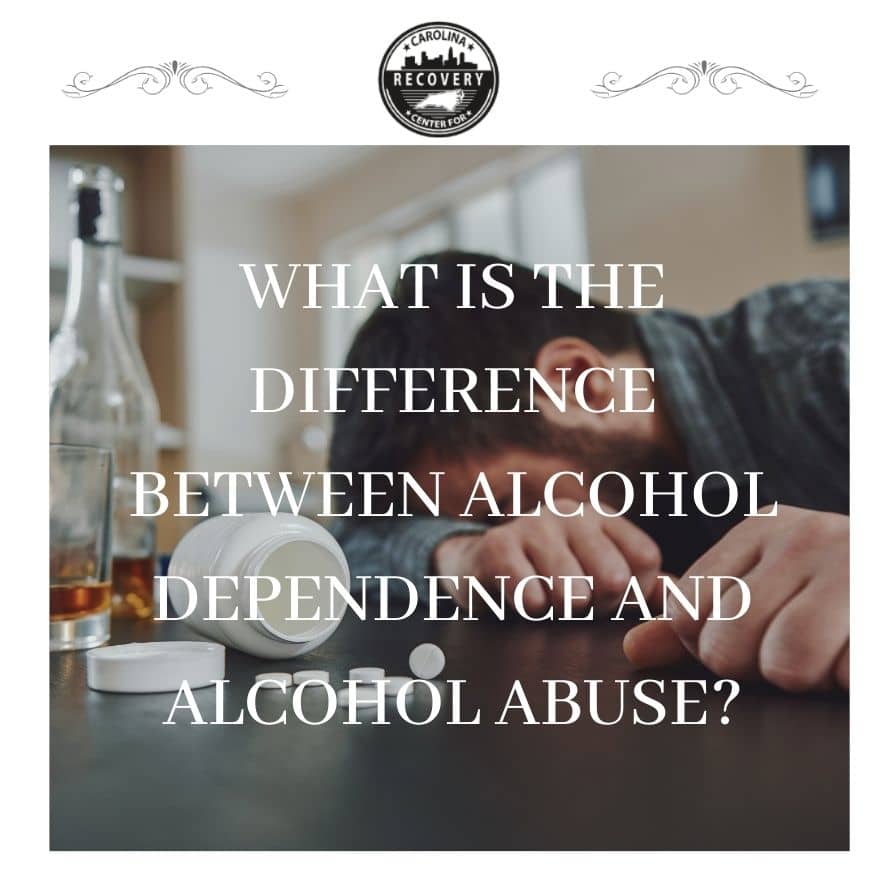What is the Difference Between Alcohol Dependence and Alcohol Abuse?

Medically Verified: 2/1/24
Medical Reviewer
Chief Editor

All of the information on this page has been reviewed and verified by a certified addiction professional.
Alcohol use is widely accepted and common in American culture. The Centers for Disease Control offer guidelines about alcohol use and recommend people drink moderately–or not at all.
But what happens if someone develops an unhealthy relationship with alcohol? And what is the line between alcohol abuse and alcohol dependence?
If you are curious about learning about alcohol dependence vs. alcohol abuse, reach out to the addiction specialists at the Carolina Center for Recovery. Learn about how our comprehensive treatment programs can help you overcome alcoholism so you can move forward.
How Much Alcohol is Too Much?
The Centers for Disease Control and Prevention (CDC) provides guidelines about moderate drinking, which is not associated with long-term health risks or complications. Moderate drinking is defined as:[1]
- One or fewer alcoholic drinks daily for women
- Two or fewer alcoholic drinks per day for men
A “drink” is:[2]
- 12 ounces of beer
- 5 ounces of wine
- 8 ounces of malt liquor
- 1.5 ounces of distilled spirits like vodka, gin, and tequila
Some drinks may contain more than one serving of alcohol, according to these guidelines. For example, some mixed drinks contain two or more shots of alcohol.
Heavy drinking is defined as drinking more than recommended over the course of a week. For men, this means having 15 or more drinks in a week. For women, it’s defined as 8 or more drinks in a week.
Heavy drinking can lead to physical dependence and addiction. It’s essential to be aware of the signs of alcohol abuse or dependence and seek treatment as quickly as possible.
Alcohol Dependence vs. Alcohol Abuse: What Are the Differences?
Alcohol abuse and alcohol dependence have different characteristics. It’s important to assess each person’s situation and seek the correct type of treatment.
Alcohol dependence
Alcohol dependence is a symptom of alcohol addiction or alcoholism. When you drink heavily for a long period, your body may adapt to the presence of alcohol in your systems and become unable to function without it. Then, if you try to stop drinking, your body will go into withdrawal.
Physical dependence is characterized by painful, sometimes life-threatening withdrawal symptoms that occur when you stop drinking or cut back on the amount that you drink.[3] While most people who struggle with alcoholism are dependent on alcohol, not everyone who abuses alcohol experiences alcohol dependence.
Alcohol abuse
Alcohol abuse is different from alcohol dependence. While it may be less severe, it can still lead to harmful consequences and complications. One episode of alcohol abuse can lead to an accident or injury that results in life-altering legal, social, and financial trouble.
Alcohol abuse can cause significant emotional, physical, and behavioral changes. Some of the signs of alcohol abuse include:
- Neglecting responsibilities at home, work, or school
- Isolating
- Binge drinking regularly–meaning that they consume a lot of drinks in a short period
- Engaging in risky behaviors, such as having unsafe sex or driving while intoxicated
Alcohol abuse and dependence are two separate conditions with different characteristics, but they are related. Without interventions, alcohol abuse can lead to alcohol dependence.
Getting Treatment For Alcohol Dependence
If you are physically dependent on alcohol, it’s likely that you have an alcohol use disorder. Alcohol use disorder is a complex condition that requires comprehensive treatment, usually beginning with medically-supported detox.[4] When someone who has been drinking heavily suddenly stops, they’re likely to experience a range of uncomfortable–and sometimes dangerous–withdrawal symptoms.
Alcohol withdrawal symptoms may include:
- Anxiety
- Tremors
- Nausea
- Sweating
- Mood swings
- Depression
- NIghtmares
- Rapid heart rate
Very rarely, people may develop a severe condition called Delirium Tremens (DTs), which causes severe symptoms that include:
- Extreme agitation
- Intense confusion
- Hallucinations
- Seizures
Getting treatment and supervision in a medically-supported detox is the best way to ensure you have a safe, complete detox from alcohol. Then, you must continue treatment to identify the roots of your alcohol dependence and learn skills to avoid relapse for life. Alcohol abuse treatment plans are tailored to meet each person’s unique needs and include:
- Individual counseling
- Group therapy
- Family therapy
- Medications
- Mental health treatment
- Relapse prevention education
- Holistic therapies like mindfulness, exercise, art therapy, and nutrition support
People with alcohol abuse may not require the same level of treatment as those with alcohol dependence. However, they must seek treatment that helps them understand why they abuse alcohol and gives them new, healthy coping skills to manage stress and challenges.
Alcohol rehab is offered in a variety of settings and levels of care. Talk to your doctor or an addiction specialist to determine which type of treatment you need to put alcohol misuse in the past and move toward a healthier future.
Find Help for Alcohol Abuse and Dependence Now
If you want to learn more about the differences between alcohol dependence vs. alcohol abuse or need to find help for yourself or a loved one, reach out to the Carolina Center for Recovery staff today. Don’t wait another day for the help and support you deserve. Effective, compassionate treatment is just a phone call away. Call us today to get started in your recovery.
References:

